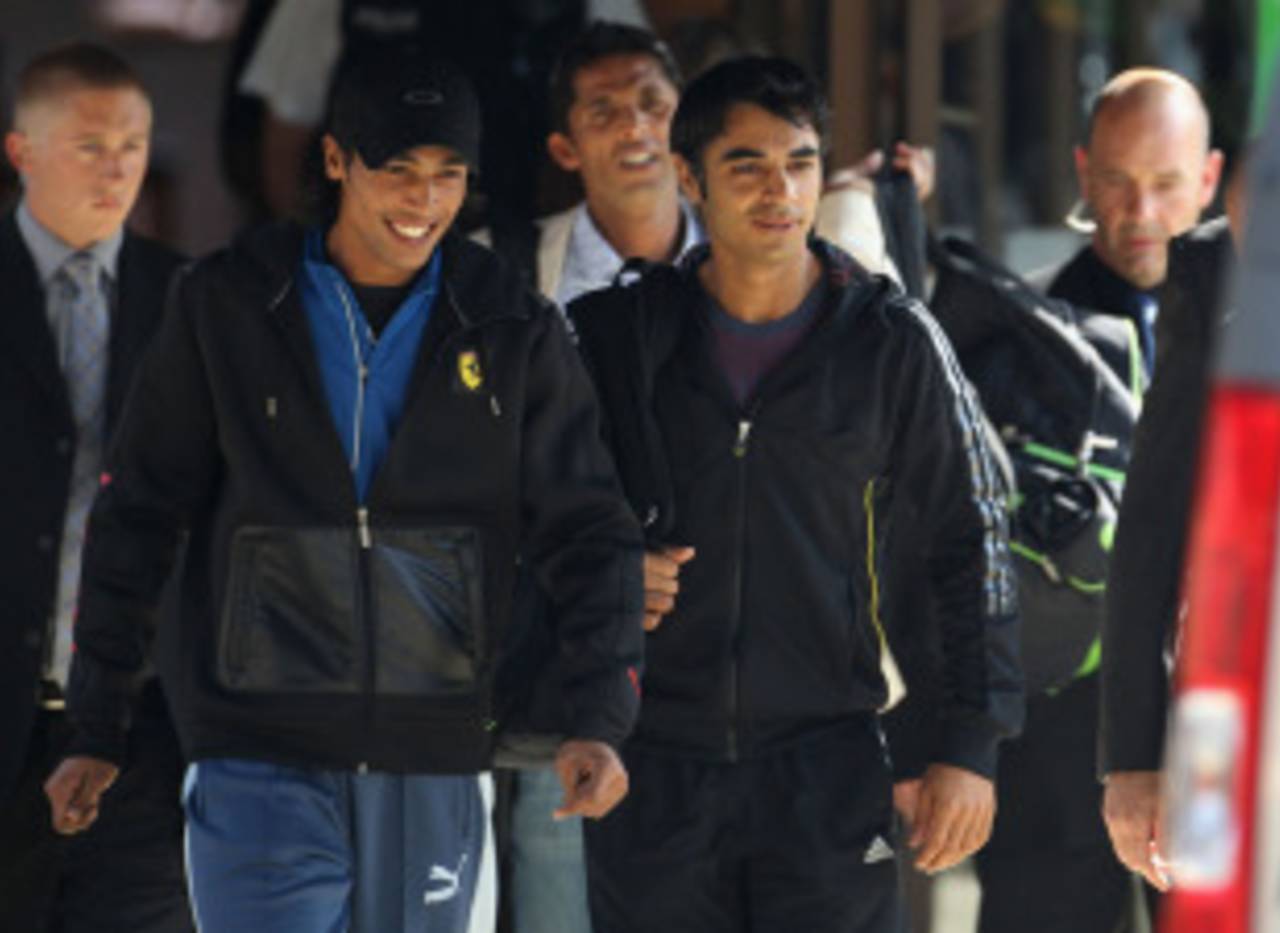Forsaken trio face toughest test
In the middle of last year, three men held the future of Pakistan cricket in their hands. A young captain in command of possibly the most compelling new-ball partnership in world cricket
Kamran Abbasi
Feb 25, 2013, 11:16 PM

Mohammad Asif, Mohammad Amir and Salman Butt shouldn't be expecting friendly verdicts in Doha • Getty Images
In the middle of last year, three men held the future of Pakistan cricket in their hands. A young captain in command of possibly the most compelling new-ball partnership in world cricket. A triumverate that might save Pakistan cricket from implosion. Instead Salman Butt, Mohammad Asif, and Mohammad Amir face calamity. Pakistan cricket is once more on the brink of disgrace.
The three players have responded to adversity in very different ways. Butt has been most vocal with shifting statements of bravado, innocence, and counter accusation. Amir has spoken up too, but generally to extract sympathy for his plight, describing the current proceedings as the toughest test of his career. Meanwhile, Asif has been monkish in his silence. The differences reflect their personalities to some degree but are probably most indicative of the legal advice they have received.
Their cricket board, for its part, after an embarrassment of bluster has virtually abandoned the defendants. Bluster comes easily to Pakistan cricket administrators and politicians, hence this dramatic change, after the intervention of the ICC to improve anti-corruption mechanisms within Pakistan cricket, presents a bleak outlook for Butt and his fellows. The present and future of Pakistan cricket forsaken on a nod, wink, and slap from the ICC.
With the reputation of Pakistan cricket about to be dragged through another gutter, whatever the outcome of the Doha tribunal, the cricket board should not be allowed to slip into the shadows so easily.
Players are responsible for their individual actions and, at the very least, for the friends they choose and whose advice they follow, but it is the PCB that facilitated the creation of a necrotic environment around the national team. The PCB and its chairman have survived this scandal relatively unscathed. Ironically, the instability of the current Pakistan government is a bigger threat to the current PCB regime than any sanction from ICC.
The Doha tribunal is the first test of the ICC's new anti-corruption code. Video recordings present worrying evidence against the players. Haroon Lorgat, ICC chief, is determined to flex his muscles. His organisation has never deviated from its determination to prosecute. What would be the ramifications for the integrity of international cricket of a failed case against spot-fixing? The ICC must have thought this one through, and supporters of the three cricketers should not expect good-news verdicts.
On the face of it, Butt is in the deepest trouble. He was the closest associate of Mazhar Majeed. Pakistan's bowlers were under his instruction. He had the most money in his room. Subsequently, Butt has made the most noise. His is the key verdict. If Butt is cleared then so must be his fellows. Equally, Butt could fall alone or earn the harshest punishment.
Asif's record of previous indiscretions, one of which is the reason why the hearing must be held in Doha and not Dubai, places him in a precarious position. Serial offenders, whatever the offences, can expect to be more severely punished. A further ban could leave Asif with insufficient time and heart to stage another comeback.
Which leaves Amir with the best prospect of leaving Doha with an opportunity of resurrecting his career in international cricket. Leaked testimonies of Waqar Younis and Shahid Afridi certainly suggest that possibility. The ICC can deliver life bans or less severe punishments depending on degree of involvement, and Amir will probably seek to argue complete ignorance of any spot-fixing arrangement even if that charge is proven against others.
Yet no true cricket supporter should seek clemency simply because of affection for Pakistan cricket or any individual cricketer. Nor should people seek punishment for the forsaken trio because of any distrust of Pakistan or its cricketers. A just verdict based on the evidence and devoid of emotion is essential.
Indeed, the three players are not the only ones on trial in Doha. By proxy, the PCB's failed system of governance is under scrutiny, as is the fairness of the ICC's new anti-corruption code. Whichever way Michael Beloff's hammer falls, one conclusion is predetermined: the integrity of cricket can only be further damaged by the events that will unfold in Doha.
Kamran Abbasi is an editor, writer and broadcaster. He tweets here